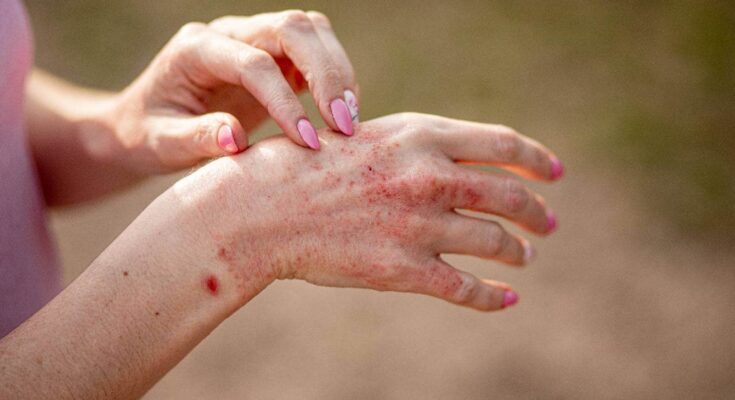How much do you understand about Atopic Dermatitis (AD)? Most people think that this is a normal skin allergy, or perhaps only children experience it. But did you know that while Atopic Dermatitis is primarily diagnosed in childhood, an estimated one in four adults with the disease, experience the onset of initial symptoms after the age of 18? The majority of the people living with this condition usually recover from the condition by adulthood. However, 10 to 30 percent of children continue to suffer into their adult life. Therefore, it’s essential to dispel atopic dermatitis myths for the optimal care and to improve the quality of life.
5 common myths about atopic dermatitis
Also known as chronic inflammatory eczema, atopic dermatitis is characterized by dry, itchy skin that oozes or weeps clear fluid when scratched. Here’s a list of 5 common myths you should be aware of:
1. Skin itching is not a major issue:
It may not seem like a severe skin concern when a person has the dry, itchy skin that comes with AD. However, it tends to grow over time and cause long-term damage to the skin. There are several studies that suggest that approximately 90 percent of AD patients experience daily itching. In addition to affecting the quality of life, atopic dermatitis can lead to anxiety, depression, other comorbidities, and even suicide, depending on the severity.
2. Atopic dermatitis is another name for eczema:
Eczema is a general term that covers many conditions that cause over-irritation of the skin. Atopic Dermatitis, however, is the most common, painful, and unrecognized form of eczema. It is still underdiagnosed and undertreated in India. Globally, it affects 15 to 20 percent of the pediatric population, while in India, it affects around 20 percent of the population.

3. It will heal on its own:
AD is one of the most prevalent but excruciating inflammatory skin diseases. Most people experience an itchy rash from moderate to severe atopic dermatitis that can cover most of the body. Persons with AD may also experience pain, cracking, oozing, redness, and crusting. The risk is higher among persons living with inadequately controlled AD which requires a planned treatment.
Over-the-counter medications may help soothe the skin for a short time. However, they will not have effect on excessive itching that leads to infection or the cause of severe AD.
If the skin rashes are frequent or increasing on the body, it is better to consult a dermatologist. Treatment and management of AD rely on the severity of the disease. It involves avoiding triggers, proper skincare, and medications for inflammation. Therapeutic options such as immunosuppressants and biologics, which are available globally for patients suffering from moderate-severe forms of AD maybe required, although expensive.
Also read: Atopic Dermatitis: An expert answers FAQs on this chronic skin condition

4. Eczema only affects kids:
Although Atopic Dermatitis is often diagnosed in children and shows symptoms at an early age, over 40 percent adults suffer from moderate to severe AD. Stress, pollution, foods, low or high humidity, and long hot showers are among the factors that might trigger AD in adults. Thus, it is essential to heed the warning signs and consult a dermatologist before itching and rashes become severe. The key to controlling AD is to diagnose it early and start treatment as soon as possible.
5. Atopic dermatitis is contagious:
AD is under no circumstances a contagious disease, or one cannot become infected, whether by skin contact or otherwise. Family history or past allergies, hay fever, or asthma, which are genetic are associated with atopic dermatitis.
It’s a growing concern because there isn’t enough awareness about the disease. Atopic dermatitis can be successfully controlled and treated with a proper consultation from dermatologists along with lifestyle changes to control the severity.
Source link




